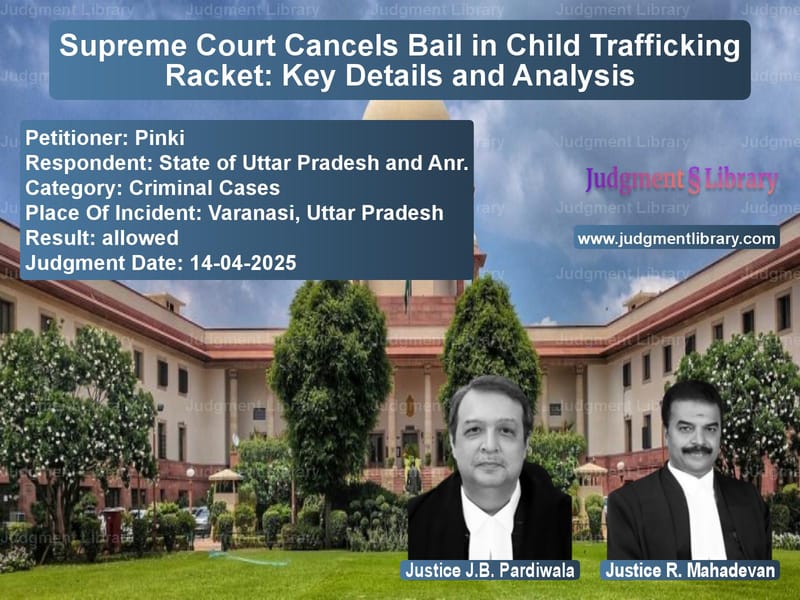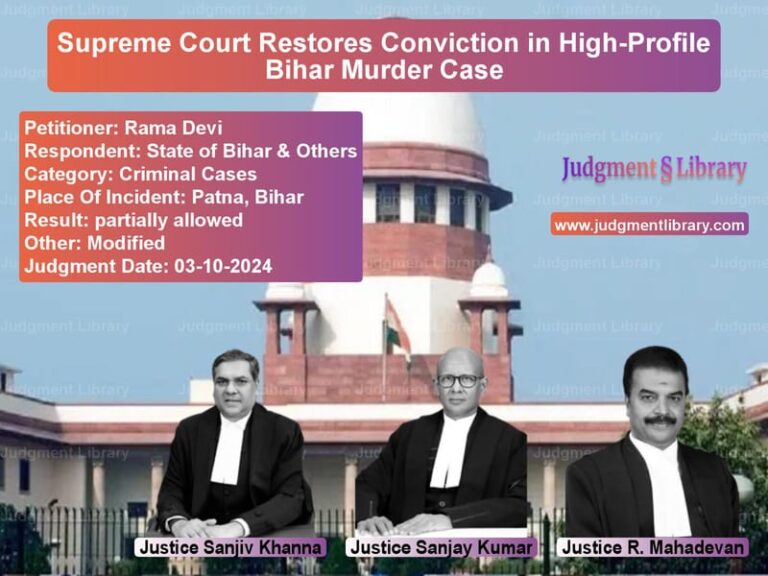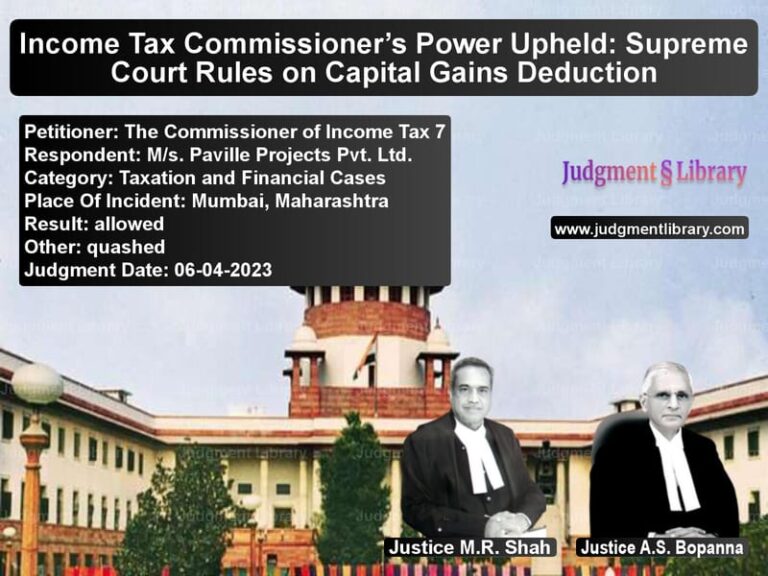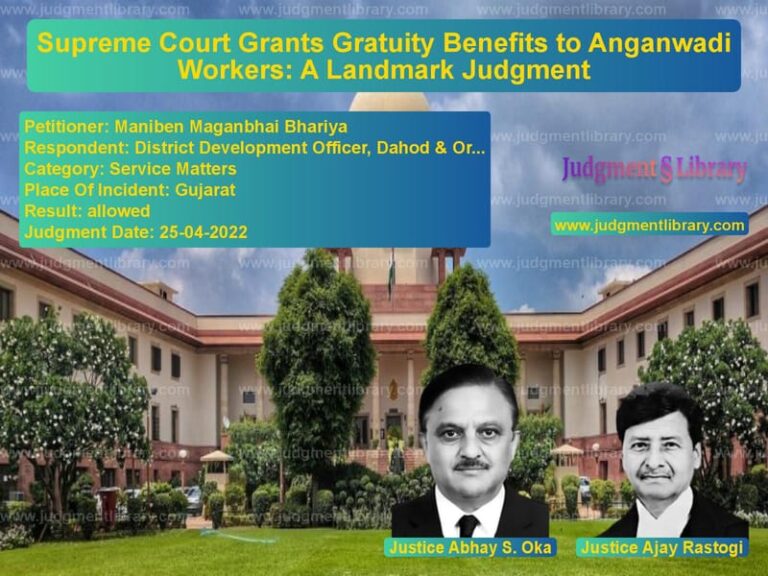Supreme Court Cancels Bail in Child Trafficking Racket: Key Details and Analysis
The Supreme Court of India recently delivered a landmark judgment addressing the grave issue of child trafficking, setting aside bail orders granted by the Allahabad High Court to 13 accused persons involved in an interstate child trafficking racket. The case, arising from multiple FIRs registered in Uttar Pradesh, highlights the alarming rise in organized child trafficking and the systemic failures in addressing such heinous crimes. The judgment, authored by Justice J.B. Pardiwala, provides a detailed analysis of the factual background, legal principles, and the urgent need for stricter enforcement of laws to combat child trafficking.
The case involves three FIRs registered in Varanasi, Uttar Pradesh, concerning the kidnapping and trafficking of minor children from impoverished backgrounds. The victims, including children as young as one year old, were allegedly kidnapped and sold to childless couples in states like Rajasthan, Jharkhand, and Bihar for sums ranging from Rs. 40,000 to Rs. 10 lakh. The accused, operating as part of a well-organized network, were charged under Sections 363 (kidnapping), 311 (causing hurt), and 370(5) (trafficking) of the Indian Penal Code (IPC).
The Supreme Court noted that the High Court had granted bail to the accused persons without adequately considering the seriousness of the charges or the prima facie evidence against them. The Court observed, “We are sorry to say but the High Court dealt with all the bail applications in a very callous manner. The outcome of this callous approach on the part of the High Court has ultimately paved way for many accused persons to abscond and thereby put the trial in jeopardy.”
The judgment extensively discusses the global and Indian context of child trafficking, citing international conventions like the UN Convention on the Rights of the Child (1989) and the Protocol to Prevent, Suppress and Punish Trafficking in Persons, Especially Women and Children (2000). It also references India’s constitutional and legal framework, including Article 23 of the Constitution, which prohibits trafficking, and Sections 370 and 370A of the IPC, which criminalize trafficking.
The Court emphasized the need for a balanced approach to bail in cases involving serious crimes like child trafficking. Quoting earlier judgments, the Court reiterated, “Grant of bail though being a discretionary order — but, however, calls for exercise of such a discretion in a judicious manner and not as a matter of course.” It further noted that the High Court failed to consider factors such as the nature of the accusations, the severity of punishment, and the likelihood of the accused absconding or tampering with evidence.
The judgment also highlights the role of each accused in the trafficking racket. For instance, Anuradha Devi, a nurse in Jharkhand, was identified as the kingpin who orchestrated the kidnapping and sale of children. Similarly, Manish Jain, a resident of Rajasthan, was found to be a key player in coordinating the illegal operations. The Court noted, “These accused persons are a big threat to the society wherever they are in the country. They have exhibited a tendency of committing a particular nature of crime, namely, child trafficking.”
The Supreme Court directed all accused persons to surrender before the trial court and issued several directives to ensure speedy justice, including the appointment of special public prosecutors, police protection for victims, and the completion of trials within six months. The Court also called for stricter implementation of recommendations from the BIRD report on human trafficking, emphasizing the need for coordinated efforts between state governments and law enforcement agencies.
Read also: https://judgmentlibrary.com/supreme-court-revives-fraud-case-against-kia-parts-manufacturers-cfo/
In conclusion, the judgment serves as a stern reminder of the judiciary’s role in safeguarding the rights of vulnerable children and ensuring that perpetrators of such crimes are held accountable. The Court’s observations and directives aim to address the systemic gaps in combating child trafficking and reinforce the importance of a robust legal framework to protect the most vulnerable members of society.
Petitioner Name: Pinki.Respondent Name: State of Uttar Pradesh and Anr..Judgment By: Justice J.B. Pardiwala, Justice R. Mahadevan.Place Of Incident: Varanasi, Uttar Pradesh.Judgment Date: 14-04-2025.Result: allowed.
Don’t miss out on the full details! Download the complete judgment in PDF format below and gain valuable insights instantly!
Download Judgment: pinki-vs-state-of-uttar-prade-supreme-court-of-india-judgment-dated-14-04-2025.pdf
Directly Download Judgment: Directly download this Judgment
See all petitions in Bail and Anticipatory Bail
See all petitions in Juvenile Justice
See all petitions in Fraud and Forgery
See all petitions in Theft and Robbery Cases
See all petitions in Custodial Deaths and Police Misconduct
See all petitions in Judgment by J.B. Pardiwala
See all petitions in Judgment by R. Mahadevan
See all petitions in allowed
See all petitions in supreme court of India judgments April 2025
See all petitions in 2025 judgments
See all posts in Criminal Cases Category
See all allowed petitions in Criminal Cases Category
See all Dismissed petitions in Criminal Cases Category
See all partially allowed petitions in Criminal Cases Category







